The spectacular rainforest surrounds of the takayna/Tarkine in Tasmania’s north-west. Photo: BOB BROWN FOUNDATION
My name is Gerard Leary. Most people call me “Spook”. There are people I have known for some time who probably don’t know my given name. I have been involved in education for nearly 50 years, a profession I fell into but do not regret I did.
Sport has played a huge part of my life both as a competitor and administrator. It has been through sport and associated lifelong friendships that I became involved in an environmental campaign.
Early last month, I travelled into the takayna/Tarkine rainforest. The takayna/Tarkine is in the north west corner of Tasmania. It is the largest remaining temperate rainforest in the southern hemisphere.
It ticks most of the boxes for World Heritage listing but has never been nominated by successive state and federal governments. Its existence is constantly under threat from recreational vehicle use, mining, and logging activities.
Currently a section of the old growth forest is threatened by the building of a tailings dam by a nearby mining operation. It is inconceivable that this should happen when there are alternate sites available. No doubt more costly options.
Through social media, I learnt a long-time friend from my 1970s Tasmania University football days, Gordon Cuff, and his partner Susie Aulich, had been arrested as part of the Bob Brown Foundation non-violent direct-action campaign.
A group of other friends originally connected by walking on the football field together was assembled. We travelled to Tullah, a town on the edge of the takayna/Tarkine rainforest, where the protesters had established a camp. We were met by friendly and committed frontline activists ranging in age from 20 to 70.
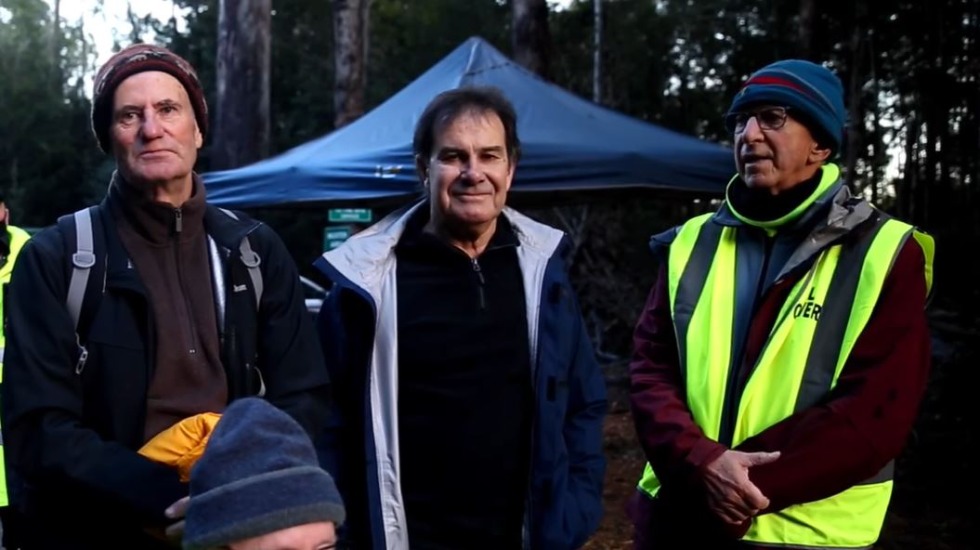
Gerard “Spook” Leary (centre) and old footy mates Basil O’Halloran (left) and Steve Smith (right) at the protest.
This camp is far removed from the concept of glamping. Glamping is probably best described as camping for rich bastards. At Tullah, people are residing in tents and resting in sleeping bags draped over hard wooden pallets to keep them off the damp ground. This is not an easy campaign.
We know what courage looks like on the football field – not taking your eyes off the ball when you receive a hospital handpass, standing under a high ball with a pack descending, playing on injured when there is nobody left on the bench etc.
We have all seen it – we can name players who show this level of commitment every time they take the field. The courage shown by frontline environmental activists may be slightly different, but it is no less inspiring – maybe even more so.
They can be subjected to physical intimidation, constant taunts and disgusting comments, especially females, on social media and other platforms. They overcome physical fears to help preserve old growth forests in tree-sits in the Tasmanian winter, while we are at home in our warm beds.
Vested interests, certain politicians, and sections of the media have created a stereotypical image of an environmental protestor. It is so far removed from the truth. A concept that has lost meaning for many. I have always been drawn to strong, but compassionate, women. When I arrived at the camp at Tullah, I didn’t know which way to look.
PLEASE HELP US CONTINUE TO THRIVE BY BECOMING AN OFFICIAL FOOTYOLOGY PATRON. JUST CLICK THIS LINK.
I have taught geography to senior secondary students for many years. Anthropogenic climate change and deforestation are prominent topics in the syllabus. Many times, I have told my students that as an older, privileged white male from an industrialised country, I have benefitted most from the Industrial Revolution. Not so much the generation before me or those after me, who are inheriting the excesses of rampant consumerism.
I have always given moral support to environmental issues, although I have probably been more passionate about other social justice issues.
But first-hand experience of an environmental campaign has made me realise how much more support I could be giving to these brave individuals who are defending the natural environment. I believe their activism transcends their commitment to preserve the natural environment to a deeper compassion for all living creatures and those that come after us.
The person who has impacted me greatly has been Anna Brozek. Anna is a 23-year-old environmental activist and filmmaker. From the time she led our first meeting, I have been greatly impressed by her organisational skills and her ability to deliver clear messages.
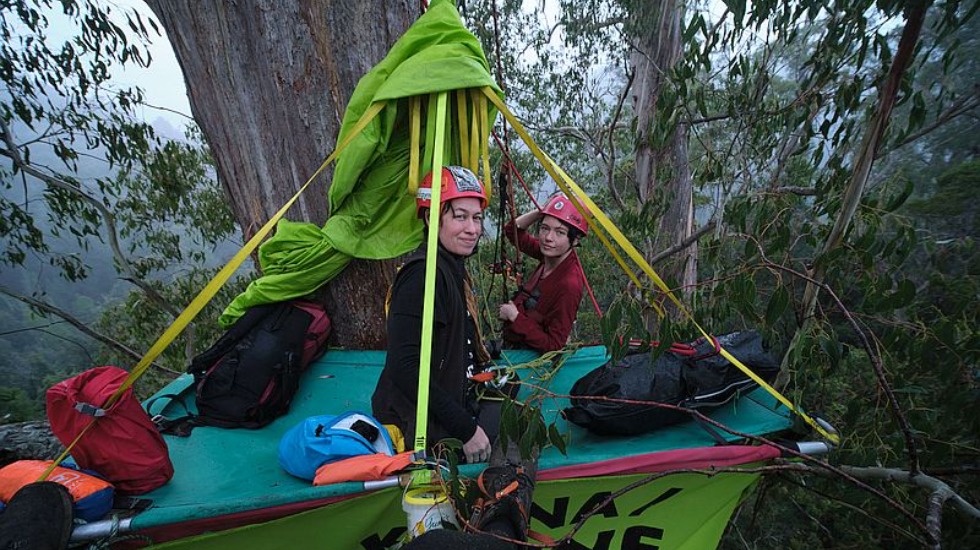
Anna Brozek (right) tree-sitting in the Tarkine 20 to 30 metres above the ground to prevent the ancient trees being bulldozed.
In our second meeting, a retired company director from Hobart called Paul Costin bravely volunteered to be arrested as part of our action the following day. Paul was asked if he had any questions. He asked if the gates were open and he was sitting on a chair in the middle of the road, were there likely to be trucks heading down the road?
Anna said there could be, but she would be between him and the truck. If she hadn’t won part of my heart before this, she did then. For the record Steve Smith also said he would be there as well. I believed them both, 100 per cent. Such courage … I’ll never forget this moment.
In the five weeks of the campaign, there have been over 40 arrests. These brave, committed individuals have come from many different backgrounds and life experiences. There have been company directors, businessmen and women, farmers, animal rescuers, academics, tradespersons, musicians, marriage celebrants, doctors, mothers, grandmothers and others.
As well as supporting the frontline campaigners, it should be going some way to dismantle the stereotypical image of an environmental activist. Let’s hope someone is listening.
Pete Hay, a friend from university footy days, was arrested last week, along with other veteran cricketers from the Thylacines Cricket Club.
He was asked: “What does it mean to be an activist?” Being the wordsmith that he is, Pete responded as only he could. “It is to be truly adult, to insist upon good and right behaviour, to be morally autonomous, to identify, to name and confront all that is an offence against ethical principle,” he said. “It is to partake of a collectively constructed ethical life, to think one’s own thoughts, to mediate these in converse with others – and, the way once determined, to act.”
I’m feeling a little more adult. I intend to continue to act, especially in supporting the brave, committed individuals at the forefront of this campaign.

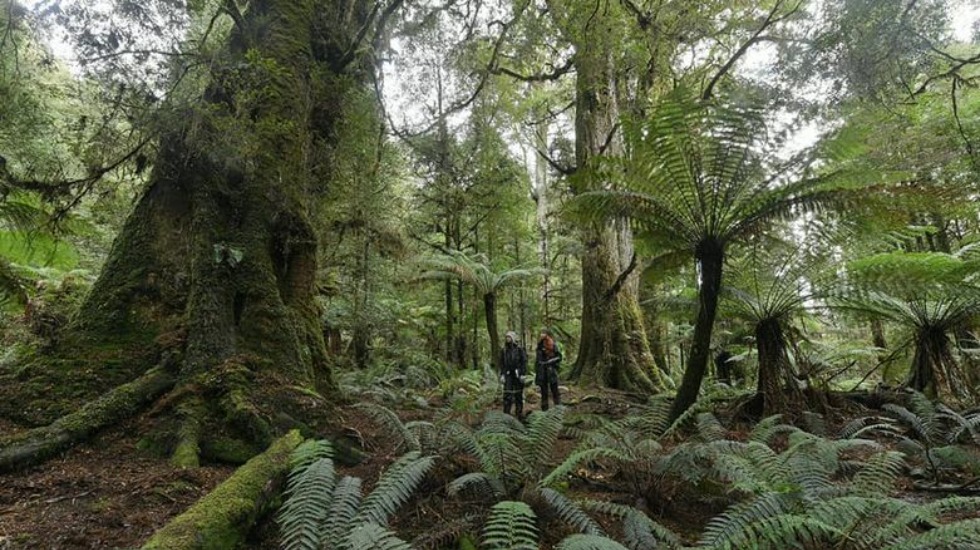

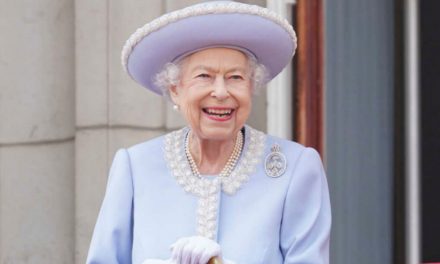
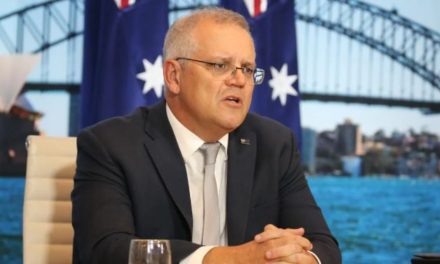
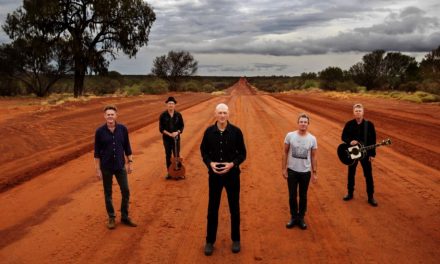






Well done Spook – pricked my conscience – happy to support the cause any way I can
Thanks for your support Rob
Cuffie (Gordon) and his partner Susie Aulich have been the catalysts for myself and others to get involved.
Great read thanks Spook. You nailed the feeling!
Cheers Jilly and Craig (Brownie).
MMG moving machines out… hard to believe but let’s hope and dream.
Thanks Craig and Jilly. I’m sure your actions are greatly appreciated by those on the frontline of the campaign.